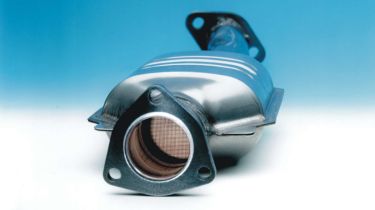New efficient catalytic converter that could save you money
Unique new design could reduce emissions and make cars cheaper to run

A new catalytic converter that could cut fuel consumption by up to three per cent has been designed by a scientist from Imperial College London.
Dr Benjamin Kingsbury’s design uses 80 per cent less platinum than existing catalytic converters, so it’ll cost less to manufacture as precious metals account for up to 70 per cent of the current component cost.
• Call for clampdown on drivers watching in-car TVs
And with fewer precious metals required, it could be less attractive to thieves, who target the parts. Prototype tests also suggest it will reduce a vehicle's CO emissions.
An existing catalytic converter is a ceramic block honeycombed with microscopic channels coated in rare metal such as platinum. They work by causing a reaction with the harmful pollutants in engine emissions.
Dr Kingsbury's design uses an advance manufacturing process to improve the structure of these channels, increasing the surface area to allow for more efficient reactions.
The new design of the device also increases fuel efficiency by preventing ‘back pressure’ - a build up of gases that can make the engine work harder.
Dr Kingsbury claims the new converter will last longer, too, with performance dropping off just four per cent over 67,000 miles; it’s 35 per cent with existing catalytic converters.
He said: "Catalytic converters are the most important component in a vehicle for controlling exhaust emissions.
• Fake DVLA websites overcharging motorists
"The design hasn’t changed since converters were developed in the forties. As my prototype uses less fuel, it could make cars cheaper to run."
Dr Kingsbury has been awarded funding from the Royal Academy of Engineering to take his prototype to the marketplace and he established a start-up company in December 2013. The next goal is to develop a production process for mass manufacture.
Find a car with the experts


